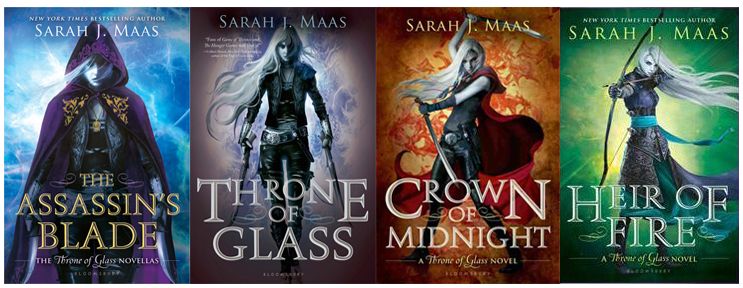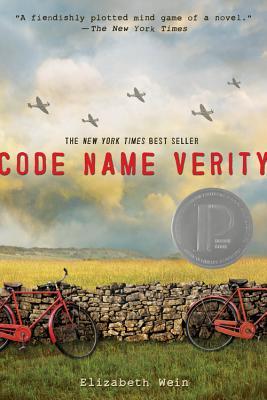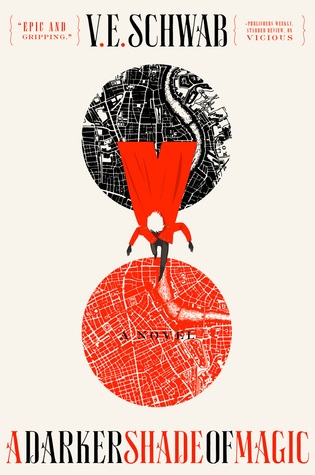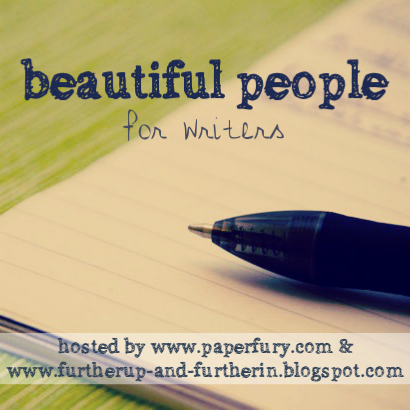I'm here to do Beautiful People for the second month in a row, as I enjoyed the sibling edition so much back in April. This time around, I'm featuring two characters who I affectionately (yes, I love them, so there) term the "mean girls" of On the Midnight Streets, my WIP.
This is mainly by request of Alyssa, because HOW COULD I NOT:
@_christinaim YVETTE. PLEASE YVETTE. Or maybe Rowen. Or Finn, if we haven't seen him before.
— Alyssa Carlier (@AlyssaC_HK) May 6, 2015
(I promise I'll do Finn at some point. He's too important not to feature.)
Yes, that's right. The aforementioned mean girls are Yvette Scarleigh and Rowen Raveneye, who actually have more in common than one thinks at first glance, and will likely become allies, if not friends, if (or should be that be when?) they meet. I think the fact that they are Alyssa's two favorite characters says a lot about her personality. *ahem* But anyway, some context for those not in the know:
(This is the closest thing to Yvette's appearance that I've been able to find, but if anyone has face-cast suggestions, shoot them my way.)
Yvette Scarleigh is the daughter of Godfrey, Earl of Hightrill, and arguably the most socially canny nobleman's daughter in the city of Peralton—or the entirety of the Mendlands, for that matter. Anyone with even a passing knowledge of Upper City society has the good sense to respect her or fear her, depending on their circumstance. She's armed with a shining reputation and manners like you've never seen, and she is strictly not to be crossed, because she'll do whatever it takes to get you back tenfold. To someone who doesn't know better, it may seem like Yvette's sole goal in life is to snag a wealthy husband, and she certainly does spend much of her time and effort working toward that. But she's ambitious and clever and absolutely terrifying if provoked, and the social waters are her domain. She's determined to be the most successful Upper City wife Peralton has ever known, whatever that may come to mean for her.
(Again, closest approximation of Rowen's face I can find and attach a name to at this point.)
Rowen Raveneye is an immigrant from Xianhai, a country on the opposite side of the continent only known to the Mendish for trade purposes, who leads an all-women Xianhaine crime ring in Peralton's Lower City, where the poorest people and the criminals live. She came to the Mendlands when she was very young, so she has little to no memories of her homeland (hence the more Mendish-sounding name, which she took for herself early on). Once she arrived in the capital, Peralton, she built her name from the ground up, working her way from petty thievery to more large-scale exploits. She has an underground network of wanted men and women under her thumb, and she's one of the most powerful criminals in all of the Lower City. The word Raveneye has almost the same effect in Peralton as the word Voldemort has in the Harry Potter universe. She's the main rival of the legendary Midnight Hatter aka Finn, and she vies against him for dominance all the time.
(The two have yet to duel it out, though. I won't say who would win, but it'd be a close match. But I don't think a physical fight between Finn and Rowen would happen, because they're kind of frenemies. They respect each other's skills but never acknowledge each other or work together because THEY'RE RIVALS.)
 |
| zhenya katava as yvette scarleigh [via] |
Yvette Scarleigh is the daughter of Godfrey, Earl of Hightrill, and arguably the most socially canny nobleman's daughter in the city of Peralton—or the entirety of the Mendlands, for that matter. Anyone with even a passing knowledge of Upper City society has the good sense to respect her or fear her, depending on their circumstance. She's armed with a shining reputation and manners like you've never seen, and she is strictly not to be crossed, because she'll do whatever it takes to get you back tenfold. To someone who doesn't know better, it may seem like Yvette's sole goal in life is to snag a wealthy husband, and she certainly does spend much of her time and effort working toward that. But she's ambitious and clever and absolutely terrifying if provoked, and the social waters are her domain. She's determined to be the most successful Upper City wife Peralton has ever known, whatever that may come to mean for her.
 |
| tian yi as rowen raveneye [via] |
Rowen Raveneye is an immigrant from Xianhai, a country on the opposite side of the continent only known to the Mendish for trade purposes, who leads an all-women Xianhaine crime ring in Peralton's Lower City, where the poorest people and the criminals live. She came to the Mendlands when she was very young, so she has little to no memories of her homeland (hence the more Mendish-sounding name, which she took for herself early on). Once she arrived in the capital, Peralton, she built her name from the ground up, working her way from petty thievery to more large-scale exploits. She has an underground network of wanted men and women under her thumb, and she's one of the most powerful criminals in all of the Lower City. The word Raveneye has almost the same effect in Peralton as the word Voldemort has in the Harry Potter universe. She's the main rival of the legendary Midnight Hatter aka Finn, and she vies against him for dominance all the time.
(The two have yet to duel it out, though. I won't say who would win, but it'd be a close match. But I don't think a physical fight between Finn and Rowen would happen, because they're kind of frenemies. They respect each other's skills but never acknowledge each other or work together because THEY'RE RIVALS.)
1. Do they get nightmares? If so, why or what of?
Yvette: She seldom has any dreams at all—frankly, there isn't much in the Upper City that will stir the subconscious into producing dreams. But if she does have nightmares, they usually involve her mother, Octavia. The thing about Octavia is that she's been raising Yvette to be the perfect society woman with the perfect husband and the perfect household, essentially everything that Octavia herself tried but failed to achieve. So Yvette's still haunted by memories of her early childhood, when Octavia did everything in her power to make sure Yvette had a flawless walk, a cultured voice, a sophisticated but demure demeanor. These measures often ended up causing Yvette a lot of physical and emotional pain, so her nightmares, when they happen, usually make her relive those times.
Rowen: Rowen's nightmares vary widely, and she gets them a lot (though she never tells a soul about them, because her fellow thieves don't need to see their leader showing such weakness), but one thing that always comes up: death. It's not so much the act of dying itself, or even the potential pain, that her subconscious keeps trying to pick apart; as a criminal, Rowen's had plenty of time to get used to the inevitability of that. It's more about a too-early death, a death that occurs without anything meaningful having led up to it. Rowen feels like she can't leave this earth without having made her mark on it first, and she doesn't want hers to be a random, senseless death. In all things, Rowen wants to matter, and so naturally her bad dreams make her feel like she doesn't.
Rowen: Rowen's nightmares vary widely, and she gets them a lot (though she never tells a soul about them, because her fellow thieves don't need to see their leader showing such weakness), but one thing that always comes up: death. It's not so much the act of dying itself, or even the potential pain, that her subconscious keeps trying to pick apart; as a criminal, Rowen's had plenty of time to get used to the inevitability of that. It's more about a too-early death, a death that occurs without anything meaningful having led up to it. Rowen feels like she can't leave this earth without having made her mark on it first, and she doesn't want hers to be a random, senseless death. In all things, Rowen wants to matter, and so naturally her bad dreams make her feel like she doesn't.
2. What is their biggest guilty pleasure/secret shame?
Yvette: She's never been outside the walls of Peralton's Upper City, where the wealthy are housed, despite the utmost necessity of keeping up a cultured, worldly air when in polite company. Most other Upper City girls Yvette's age have been abroad multiple times, but even her father's title can't keep the family wealthy enough for the expenses of travel. It's not exactly that she feels like she's lying. She lies all the time and is good at it and is not bothered by it in the least. But she hates that feeling of being lesser and having to patch things up because of it. She blames her father for this, as he's rather bumbling and has no head for management and is really bad at worming his way into the king's good graces, which has left the family finances in semi-disarray for the past few years.
Rowen: Since she's been in the Mendlands since she was really, really little, she's illiterate in Xi, the language of those native to Xianhai, and no longer as fluent when speaking as she'd like to be. She's been accused on multiple occasions of not being a 'true' Xianhaine by subordinates, and this makes it difficult to maintain cohesion within her ranks. She's been having her second-in-command, a much older woman, tutor her so that she can relearn the language, but it stings her pride to have to ask her second for help. But this touches on a deeper shame that affects almost every aspect of Rowen's character: she's constantly in a state of cultural limbo, and she doesn't know which side of her identity she owes loyalty to.
3. Are they easily persuaded or do they need more proof?
Yvette: One should basically describe Yvette as the antithesis of gullible. She's had trust issues all her life because she's never been trustworthy herself, so she won't believe anything anyone tells her if there isn't concrete evidence before her eyes. This is especially true of her peers' interpersonal dynamics—if someone tells her that two people are in love or about to kill each other or anywhere in between, she's not even going to consider their input on the situation unless she can see and make decisions on everything with her own mind. She places her own judgment first, last, and foremost, as it's the thing that's led her to her present advantageous position, so she won't let people persuade her of anything, because she's seen others socially destroyed by making the same mistake.
Rowen: Rowen's probably the most street-smart character in the entire book. She's practically at the top of the Lower City food chain, and she didn't get there by putting her faith in the wrong people. (Or any people at all, really.) People are not going to persuade her of things easily, especially since she often sees people robbed or brutally murdered for being even a little too trusting—and she herself has manipulated gullible people many, many times. Like Yvette, she relies heavily on her personal judgment, with all its prejudices and petty fears and lethal strategies, to get things done, because she knows from experience that trusting one's own self is the most effective way to go in her world.
Rowen: Rowen's probably the most street-smart character in the entire book. She's practically at the top of the Lower City food chain, and she didn't get there by putting her faith in the wrong people. (Or any people at all, really.) People are not going to persuade her of things easily, especially since she often sees people robbed or brutally murdered for being even a little too trusting—and she herself has manipulated gullible people many, many times. Like Yvette, she relies heavily on her personal judgment, with all its prejudices and petty fears and lethal strategies, to get things done, because she knows from experience that trusting one's own self is the most effective way to go in her world.
4. Do they suffer from any phobias? Does it affect their life in a big way?
Yvette: She doesn't have any phobias in the medical sense, but she has a very deep-seated fear of being ostracized, instilled in her by her childhood and her experiences with Upper City life. This fear has shaped almost all her actions from the day she was first exposed to polite company, and it dictates all her motivations. Whatever happens, she will not let herself become a pariah, because the unknowable vastness and frightening implications of being rejected by her peers terrify her.
Rowen: Like Yvette, Rowen doesn't have any medical phobias. The few worldly fears she has are quickly dismissed, because fear is something she cannot afford when she's holding so many deadly and morally ambiguous people under her command. She's always the first to head into danger, though not without first arming herself with weapons both tangible and abstract. But she is truly and terribly afraid of having everything she's worked so hard and paid in blood and tears for—her underground empire, her status, her power—taken away. This influences all of her day-to-day decisions.
Rowen: Like Yvette, Rowen doesn't have any medical phobias. The few worldly fears she has are quickly dismissed, because fear is something she cannot afford when she's holding so many deadly and morally ambiguous people under her command. She's always the first to head into danger, though not without first arming herself with weapons both tangible and abstract. But she is truly and terribly afraid of having everything she's worked so hard and paid in blood and tears for—her underground empire, her status, her power—taken away. This influences all of her day-to-day decisions.
5. What do they consider their “Achilles heel”?
Yvette: Yvette believes she has two weaknesses: her family and her lack of a husband. To her, they're evils brought upon her by her situation. If someone targets her in either of those two areas, she is undeniably vulnerable. She does her best to shove those weak spots under the carpet, and most of the time, she succeeds. These are the only real cracks in her armor—or at least the only ones she herself sees, and she resents them with everything she has in her.
Rowen: Rowen's "Achilles heel" is her fellow Xianhaines. She will never ignore the call of someone she feels is her countryman—she feels a very strong sense of duty toward Xianhai, despite the fact that she hasn't actually been there for at least fifteen years. This sense of duty, as one might expect, leads her astray at times and can be used to exploit her emotions. She knows that it has this effect on her, but she just can't let go of that feeling that she owes something to what she considers her 'home country'.
6. How do they handle a crisis?
Yvette: As a general rule, Yvette does extremely well under pressure; it's essentially how she's secured such a high place in the social spheres of Peralton. She takes control of the problem politely but firmly before anyone else can, and then just as politely and just as firmly, she does away with it. Whether it's a ruined dress or a growing rumor or a blackmail threat, you can count on Yvette Scarleigh to turn it in her favor without letting anyone know what she's doing, all while keeping her reputation as snow-white as it's always been. Lots of people think that Yvette has her grip on every bit of the Upper City's social bubble; they're not wrong. She's got claws in everyone's skin. She just digs them in deeper when the times call for it, and people have no choice but to smile through the pain.
Rowen: Rowen's response to a crisis: eliminate all potential threats. This is true in both the short and long term. It is also true of both people and events. Anything or anyone that could potentially cause a problem or is currently causing a problem is immediately slashed out of the picture. Some document might return to haunt her later? It's gone. Someone's holding too much sensitive information? Goodbye. Rowen's method of handling a problem can be boiled down to ripping apart everything in her way until she's got a clear, straight path to the finish that she can take with maximum speed. A little primitive and paranoid when put that way, perhaps, but it works like nothing the Lower City has ever seen. It's efficient and pragmatic and has been known to involve a lot of blood.
Rowen: Rowen's response to a crisis: eliminate all potential threats. This is true in both the short and long term. It is also true of both people and events. Anything or anyone that could potentially cause a problem or is currently causing a problem is immediately slashed out of the picture. Some document might return to haunt her later? It's gone. Someone's holding too much sensitive information? Goodbye. Rowen's method of handling a problem can be boiled down to ripping apart everything in her way until she's got a clear, straight path to the finish that she can take with maximum speed. A little primitive and paranoid when put that way, perhaps, but it works like nothing the Lower City has ever seen. It's efficient and pragmatic and has been known to involve a lot of blood.
7. Do they have a temper?
Yvette: Yes indeed, though perhaps not in a traditional sense. It's probably one of her defining traits, as her actions as a result of her temper have intimidated just about everyone in the Upper City at this point. If Yvette feels she's been slighted in any way, her anger will flare up, but it'll manifest itself in the most subtle and poisonous possible way. She will let nothing slip in her outward appearance, but she knows how to manipulate the current of gossip and the tide of the Upper City's general consensus, and she won't hesitate to do it. She'll take control of any situation quickly and quietly, and no one she targets will know what hit them. If someone tries to so much as crease her social standing or her chances at a good marriage, she'll bring them down.
Rowen: Let's say that's an understatement. She always has ample amounts of festering anger against Alastair's corrupt government and those who are prejudiced against Xianhaines and women. Her temper inspires fear in the hearts of enemies and steadfast loyalty (with a healthy dose of fear?) from the girls and women she takes in. Her temper in and of itself is a force of nature. She's had plenty of time to learn that volatile and violent is a great combination of character traits when consolidating power, and she's perfected her anger, honed it into a wickedly sharp blade both literally and figuratively. Think of it this way—if you really tick her off, you'll know because the streets will be running red with your blood in about 2.5 seconds.
Rowen: Let's say that's an understatement. She always has ample amounts of festering anger against Alastair's corrupt government and those who are prejudiced against Xianhaines and women. Her temper inspires fear in the hearts of enemies and steadfast loyalty (with a healthy dose of fear?) from the girls and women she takes in. Her temper in and of itself is a force of nature. She's had plenty of time to learn that volatile and violent is a great combination of character traits when consolidating power, and she's perfected her anger, honed it into a wickedly sharp blade both literally and figuratively. Think of it this way—if you really tick her off, you'll know because the streets will be running red with your blood in about 2.5 seconds.
8. What are their core values and/or religious beliefs?
Yvette: The Mendlands eradicated religion during the Laceblade Uprising that resulted in the founding of the kingdom because the two first queens, Rosalind and Clarabel, saw it only as something that would corrupt and skew government. There is no religion but the state—at least not officially, anyway. Due to her thoroughly Mendish upbringing, Yvette doesn't have any religious beliefs to speak of. But she places huge importance on the will to ascend, the will to be better, whatever 'better' means at any given moment in time. This could be because she's been trained to be a social-ladder climber and nothing else, with no other real skills, but she also feels it's a part of her own personality.
Rowen: Rowen's core value can be summed up as the freedom to establish identity. This is cultural identity, mental identity, emotional identity—you name it. She wants to be wholly her own, and the ability and room to do that is something that she holds close to her heart. She will not be bound or caged or subjugated when she still has so much to find out about herself, when so much of herself is still coming into being. She wants all the space in the sky she needs to throw her voice at, and all the space under the earth so she can better tread the ground beneath her feet. She can't imagine living with anything less, which is one reason why she's fought so hard to cling to her freedom in the Lower City.
Rowen: Rowen's core value can be summed up as the freedom to establish identity. This is cultural identity, mental identity, emotional identity—you name it. She wants to be wholly her own, and the ability and room to do that is something that she holds close to her heart. She will not be bound or caged or subjugated when she still has so much to find out about herself, when so much of herself is still coming into being. She wants all the space in the sky she needs to throw her voice at, and all the space under the earth so she can better tread the ground beneath her feet. She can't imagine living with anything less, which is one reason why she's fought so hard to cling to her freedom in the Lower City.
9. What things do they value most in life?
Yvette: She was taught from a young age that complete financial security is the first thing a woman should set her sights on, preferably in the form of a rich and easily exploited husband with a very nice house, and everything else is secondary. So that's definitely part of it. But even broader than that is the idea of shining, flawless success and the eventual goal of perfection. She doesn't want a storybook life necessarily; she wants a life that is above all imagining.
Rowen: To be short about it: her life, her spirit, her wits, and her weapons. She's made a habit over the years of not forming dangerous attachments to much else, because anything—possessions, loved ones, you name it—can be lost in an instant. There's a kind of stark beauty in simplicity and utility that Rowen appreciates, so she tries to surround herself with that and sever ties to anything extraneous.
Rowen: To be short about it: her life, her spirit, her wits, and her weapons. She's made a habit over the years of not forming dangerous attachments to much else, because anything—possessions, loved ones, you name it—can be lost in an instant. There's a kind of stark beauty in simplicity and utility that Rowen appreciates, so she tries to surround herself with that and sever ties to anything extraneous.
10. What is one major event that helped shape who they are?
Yvette: Yvette formally made her entrance to society at the age of thirteen, having completed all education her parents felt she needed and reached an acceptable level of maturity. This was an unusual occurrence indeed, since most Upper City girls wait to have their 'coming-out' ceremonies until they're fifteen or sixteen. When she had her cotillion (essentially a ball that spotlighted her introduction to the marriage market), however, she was immediately eclipsed by Lavender Hawkins, mainly because Yvette doesn't have the 'typical' beauty that the Mendish approve of and Lavender, frankly, has it in spades. The anger and envy she felt that night has helped Yvette use her wiles and her incisive, impeccable taste to her advantage ever since.
Rowen: When Rowen first got to Peralton, she was captured by a disgusting gang of men who made their living selling 'exotic' young girls to brothels. Keep in mind she was really little at the time, probably around four or five. She escaped, obviously, but only by the skin of her teeth, and only after killing three people, which she still isn't sure how she managed. The guilt of leaving the other girls there to that fate haunts her to this day. This has left her with an intense distrust of men and a fierce protectiveness of those she considers 'her own'—that is, Xianhaine girls and women.





















